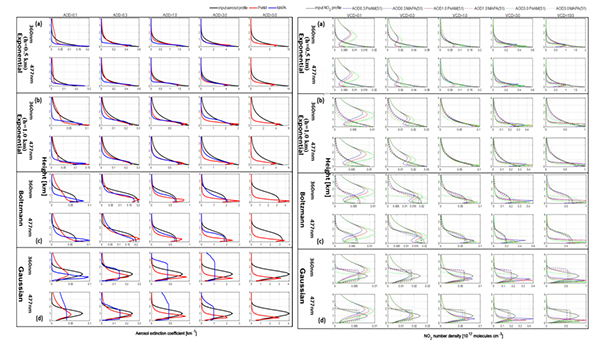
Given the importance and complexity of the aerosol effects on the atmospheric radiative transfer, it is also important to study the impact of heavy aerosol loads on the MAXDOAS inversion algorithm.
According to a paper recently published on Atmospheric Chemistry and Physics, researchers evaluated the profile retrievals of aerosols and trace gases for MAX-DOAS measurements under different aerosol scenarios to help obtain better understanding of MAX-DOAS measurements under high pollution levels.
The research team was led by Prof. XIE Pinhua from Hefei Institutes of Physical Science (HFIPS), Chinese Academy of Sciences. And the research was also carried out in collaboration with Prof. Wagner Thomas from Max Planck Institute for Chemistry (MPIC) in Germany.
For different aerosol pollution scenarios, researchers evaluated the performances of two inversion algorithms. Three vertical profiles shapes described in different parameters, including Exponential, Boltzmann and Gaussian shapes, were used to represent the state of the aerosol.
"The two algorithms, one based on optimal estimation; the other used a parameterized approach, successfully retrieved the near-surface values of aerosol extinction and trace gas,” said TIAN Xin, lead author of the paper.
Compared to previous studies, much larger ranges of aerosol optical depth (AOD) and NO2 vertical column densities (VCDs) are covered in the research.
They found the NO2 profile was systemically dependence on the NO2 VCD, whereas rather low dependence on the aerosol profiles. For low NO2 VCDs, a strong relative overestimation of the retrieved NO2 profile was found and vice versa. The large systematic deficiencies between the input and retrieval results can be improved by optimizing the covariance matrix of the a priori uncertainties for the optimal estimation algorithm.
The work was supported by the National Natural Science Foundation of China (grant nos. 41530644, U19A2044, 41975037, and 4210050475),
Link to paper: Technical note: Evaluation of profile retrievals of aerosols and trace gases for MAX-DOAS measurements under different aerosol scenarios based on radiative transfer simulations

Comparison of the profiles retrieved by two inversion algorithms for 360 nm (first line) and 477 nm (second line) and the corresponding input profiles at different aerosol scenarios. The aerosol profile (a) and NO2 profile (b) were shown. The red and blue curves indicate the results from optimal estimation and parameterized, respectively. (Image by TIAN Xin)
Contact:
ZHAO Weiwei
Hefei Institutes of Physical Science (http://english.hf.cas.cn/)
Email: annyzhao@ipp.ac.cn